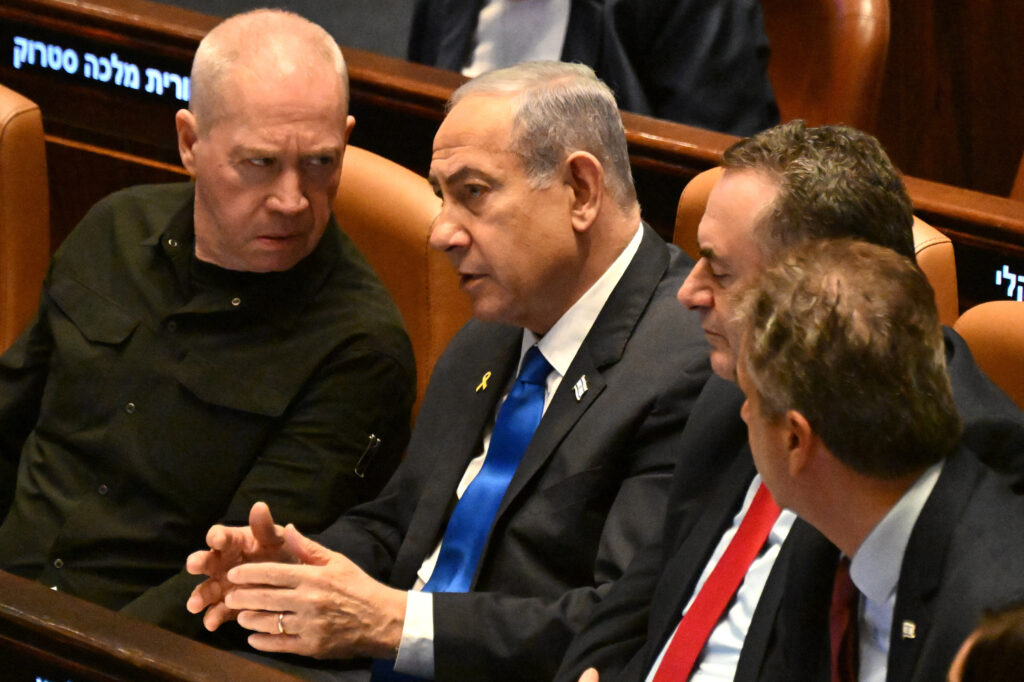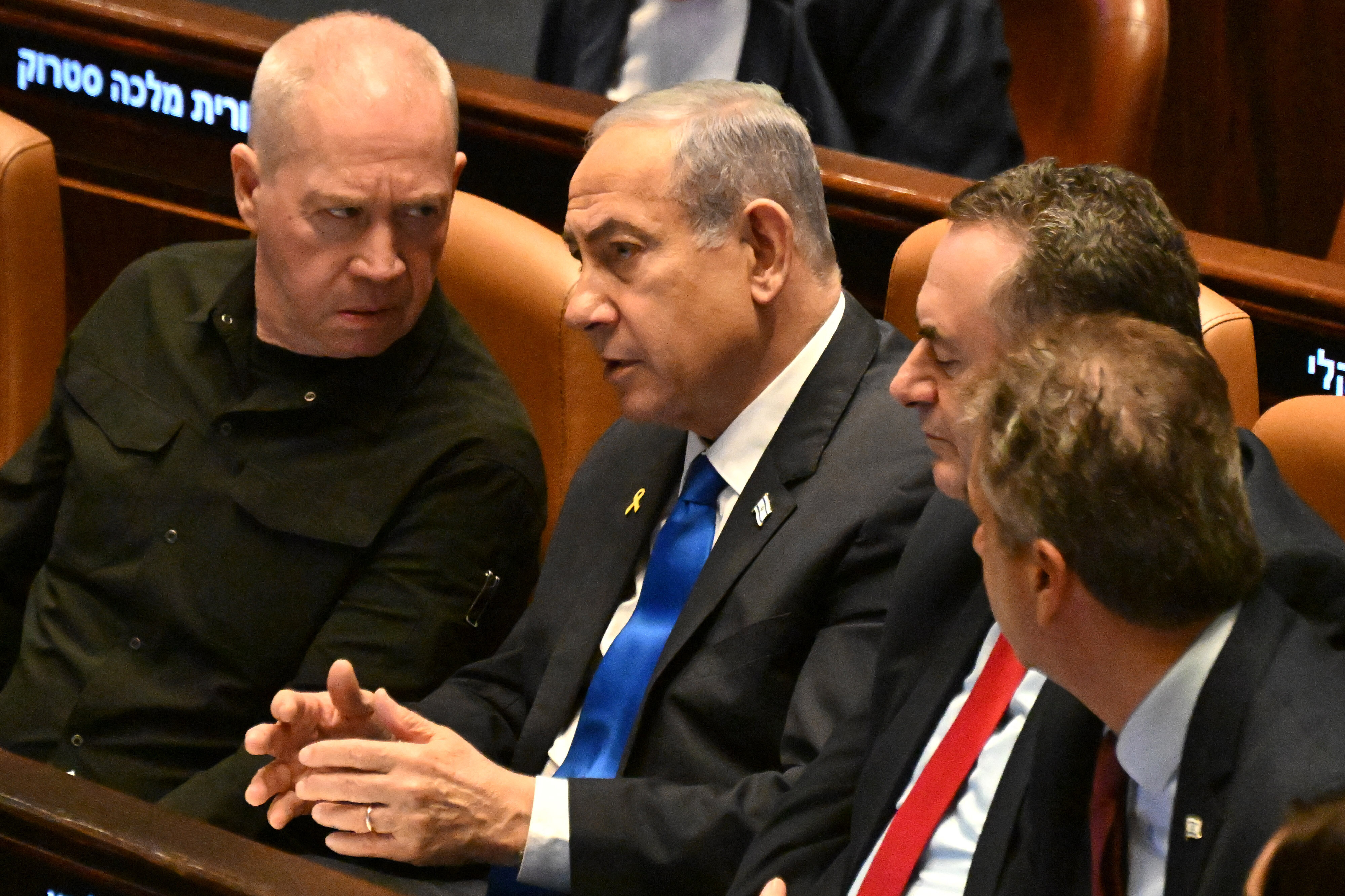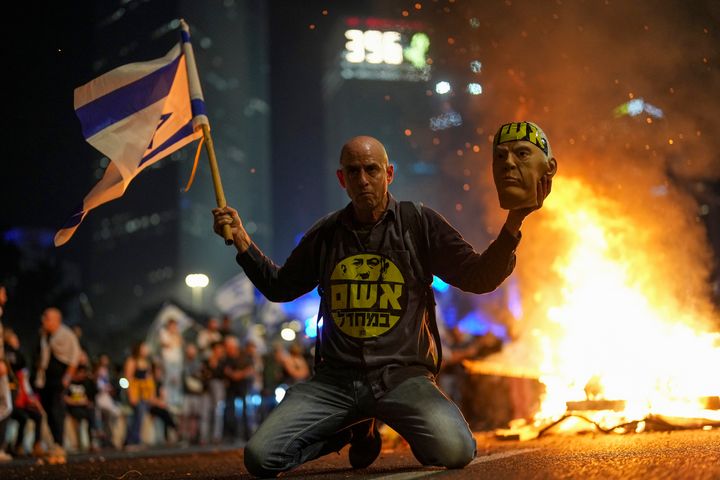Israel’s Netanyahu Dismisses His Defense Minister As Wars Rage. Protests Erupt Across The Country.
Israeli Prime Minister Benjamin Netanyahu has dismissed his popular defense minister, Yoav Gallant, in a surprise announcement.


JERUSALEM (AP) — Israeli Prime Minister Benjamin Netanyahu on Tuesday dismissed his popular defense minister, Yoav Gallant, in a surprise announcement that came as the country is embroiled in wars on multiple fronts across the region. The move sparked protests across the country, including a mass gathering that paralyzed central Tel Aviv.
Netanyahu and Gallant have repeatedly been at odds over the war in Gaza. But Netanyahu had avoided firing his rival before taking the step as the world’s attention was focused on the U.S. presidential election. Netanyahu cited “significant gaps” and a “crisis of trust” in his Tuesday evening announcement as he replaced Gallant with a longtime loyalist.
“In the midst of a war, more than ever, full trust is required between the prime minister and defense minister,” Netanyahu said. “Unfortunately, although in the first months of the campaign there was such trust and there was very fruitful work, during the last months this trust cracked between me and the defense minister.”
In the early days of the war, Israel’s leadership presented a unified front as it responded to Hamas’ Oct. 7, 2023, attack. But as the war has dragged on and spread to Lebanon, key policy differences have emerged.
While Netanyahu has called for continued military pressure on Hamas, Gallant had taken a more pragmatic approach, saying that military force has created the necessary conditions for at least a temporary diplomatic deal that could bring home hostages held by the militant group.
In a late-night news conference broadcast on national TV, Gallant said that he had disagreed with Netanyahu over three main issues: the need to end controversial exemptions from the military draft for ultra-Orthodox men, the urgent need for a hostage deal and the need to establish an official commission of inquiry into the political and security failures of Oct. 7, when Hamas militants stormed into Israel and killed 1,200 people and took 250 others hostage. Israel estimates that about 100 hostages remain in captivity, only about 65 of them still alive.

With military service compulsory for most Jews, Gallant said that drafting the ultra-Orthodox was both an issue of fairness and security at a time when Israel faces so many challenges.
He said a hostage deal was needed “as quickly as possible, when they are still alive” and said there will be “no forgiveness” for neglecting them. And he said a full investigation into the events of Oct. 7 was the only way to ensure the government would learn the proper lessons. Netanyahu has rejected calls for an inquiry, saying it should only take place when the war is over.
Gallant ended his statement by honoring the soldiers serving in the army and those who have died in the wars. He held up his hand and saluted as he walked away from the podium.
Many of the families of the hostages, along with tens of thousands of people who have joined anti-government protests, accuse Netanyahu of scuttling a deal in order to maintain his hold on power.
Netanyahu’s hard-line partners have threatened to bring down the government if he makes concessions to Hamas, raising the risk of early elections at a time when the prime minister’s popularity is low. This week, authorities announced the arrest of a Netanyahu aide on suspicion of leaking classified information to foreign media that gave the prime minister political cover as hostage talks fell apart.
“Firing Gallant in the middle of a war is an act of madness,” opposition leader Yair Lapid said on X. “Netanyahu is selling Israel’s security and the Israeli army soldiers for a disgraceful political survival.”
Israel’s president, Isaac Herzog, whose largely ceremonial office is meant to help unify the country, called the dismissal “the last thing Israel needs.”
The grassroots forum representing hostage families said Gallant’s dismissal is “a direct continuation of the ‘efforts’ to torpedo the abductee deal.”
Within hours, thousands of protesters gathered in central Tel Aviv, blocking the city’s main highway and crippling traffic. The crowd, many holding blue and white Israeli flags and others blowing whistles and pounding drums, gathered around multiple bonfires. Several thousand people demonstrated outside Netanyahu’s home in Jerusalem and elsewhere in the city. Protesters gathered and blocked roads in several other spots across the country, and Israeli TV stations showed images of police scuffling with protesters.
The dismissal comes at a delicate time. Israeli troops remain bogged down in Gaza, over a year after invading the territory in a war that has killed over 43,000 Palestinians, including tens of thousands of civilians, and caused widespread destruction, while Israeli ground troops are pressing ahead with a month-old ground invasion against Hezbollah militants in Lebanon. Hundreds of Israeli soldiers have been killed in the fighting.
Israel also has clashed with Iranian-backed groups in Iraq, Syria and Yemen, and is facing the possibility of another strike by Iran. Iran has vowed to avenge an Israeli strike that came in response to an Oct. 1 Iranian missile attack, itself a reprisal for earlier Israeli attacks on Iranian-linked targets.
On Monday, Gallant announced he had sent out thousands of draft notices to young ultra-Orthodox men. The system of exemptions for religious men has bred widespread resentment among the secular majority, and Israel’s Supreme Court has ordered the government to scrap the system. Netanyahu, whose governing coalition depends on ultra-Orthodox parties, has not yet implemented the order.
Channel 13 TV said Netanyahu had also taken advantage of the U.S. election, when American attention is focused elsewhere, to dismiss his rival.
The White House on Tuesday declined to comment on the firing but called Gallant “an important partner on all matters related to the defense of Israel.”
“As close partners, we will continue to work collaboratively with Israel’s next minister of defense,” the White House National Security Council said.
Gallant, a former general with a gruff, no-nonsense demeanor, has emerged as the most popular figure with the public in Israel’s wartime government. Gallant has worn a simple, black buttoned shirt throughout the war in a sign of sorrow over the Oct. 7 attack and developed a strong relationship with his U.S. counterpart, Defense Secretary Lloyd Austin.
A previous attempt by Netanyahu to fire Gallant in March 2023 sparked widespread street protests against Netanyahu. He also flirted with the idea of dismissing Gallant over the summer but held off until Tuesday’s announcement.
Israel Katz, his replacement, currently serves as foreign minister and is a longtime Netanyahu loyalist and veteran Cabinet minister. Katz thanked Netanyahu and pledged to lead the security establishment to victory in the wars against Israel’s enemies.
Katz, 69, was a junior officer in the military decades ago and has little military experience, though he has been a key member of Netanyahu’s Security Cabinet over the years. Gideon Saar, a former Netanyahu rival who rejoined the government in September, will take the foreign affairs post.
Netanyahu has a long history of neutralizing his rivals. In his statement, he claimed he had made “many attempts” to bridge the gaps with Gallant.
“But they kept getting wider,” he said. “Our enemies enjoyed it and derived a lot of benefit from it.”
___
Associated Press writers Eleanor H. Reich in New York and Aamer Madhani in Washington contributed reporting.








